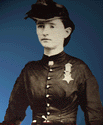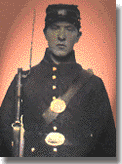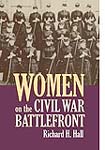Perhaps the most poignant story about women in the Civil War is one
told in the book Women in War , 1866, by Frank Moore. In 1863, at age 19, a woman known only as Emily, ran away from home and joined the drum corps of a Michigan Regiment.
The regiment was sent to Tennessee and during the struggle for Chatanooga a minie ball pierced the side of the young soldier. Her wound was fatal and her sex was disclosed. At first she refused to disclose her real name but as she lay dying she consented to dictate a telegram to her father in Brooklyn. Forgive your dying daughter. I have but a few moments to live. My native soil drinks my blood. I expected to deliver my country but the fates would not have it so. I am content to die. Pray forgive me...... Emily.
"Major" Pauline Cushman claimed
Confederate sympathy yet
she actually spied for the Union,
often as an actress.
Her many adventures were
capitalized upon by P.T. Barnum
who advised her tours.
|  |
Did you know that a woman was awarded The Medal of Honor?
Dr Mary Walker, a surgeon in the Civil War, was awarded the nation's highest honor by President Andrew Johnson. The citation reads, in part, Whereas it appears from official reports that Dr. Mary E. Walker, a graduate of medicine, has rendered valuable service to the government, and her efforts have been earnest and untiring in a variety of ways, and that she was assigned to duty and served as an assistant surgeon in charge of female prisoners at Louisville, KY., under the recommendation of Major-Generals Sherman and Thomas, and faithfully served as contract surgeon in the service of the United states, and has devoted herself with much patriotic zeal to the sick and wounded soldiers, both in the field and hospitals, to the detriment of her own health, and has endured hardships as a prisoner of war four months in a southern prison while acting as contract surgeon....
 | Dr. Walker was an early suffragette,
one of the earliest women physicians,
a champion for more comfortable
clothing for women and a pioneer
for women in many areas that
we take for granted today.
Her medal was rescinded,
then subsequently restored
by President Carter.
More about Dr. Walker:
Doctor, Prisoner, Patriot |
The story of Ginnie and Lottie Moon is a fascinating one - two sisters who cleverly and brazenly spied for the Confederates during the Civil War - and got away with it. Look here for their adventures.
Emmeline Piggott
became North Carolina's
most famous spy and smuggler. She is said to have carried
dispatches in the large pockets under her full skirts. She avoided
capture many times but was finally caught,
arrested and imprisoned. She was eventually released and sent
home.
Elizabeth C. Howland, trained in medicine by her father,
was highly successful as a Confederate spy. She often sent
her young son and daughter to carry dispatches. Appearing
innocent, the children were allowed to pass through enemy lines undisturbed.

Susie Baker, later King Taylor, was born a slave in 1848 in Georgia. She learned to read and write while living with her grandmother. Susie gained her freedom in 1862 as contraband of war and was appointed laundress of the 33rd U.S. Colored Troops. In 1862, Susie married Sergeant Edward King, one of the members of this regiment. Although she was only fourteen years old, she taught the soldiers in her husband's regiment to read and write and did their laundry. In January 1863, Susie King began to nurse the wounded men who returned to camp from a raid up the St.
Mary's River. Susie also learned to clean, load and fire a musket. Susie King nursed the wounded soldiers for four years until she and her husband were mustered out of the regiment in 1866. However she retained her interest in nursing and helped organize a branch of the Woman's Relief Corps. She published her autobiography in 1902, "Reminiscences of my life in camp with the 33d United States Colored Troops late 1st S.C. Volunteers." The complete book can be found online at Susie King Taylor.
A Unique Buffalo Soldier
Cathay Williams was born into slavery near Independence, Missouri in 1842. She grew up and worked as a house-girl for wealthy planter William Johnson in Jefferson City, Missouri. During the Civil War, Union soldiers liberated Williams and she spent the remainder of the war as a paid servant of the Union Army.
On November 15, 1866, shortly after her job with the Army ended, Cathay Williams disguised her gender and joined the 38th Infantry, Company A, in St. Louis. At the time, there was no requirement for a physical examination and she enlisted using the name William Cathay.
She was discharged from the Army at Ft. Bayard, New Mexico on October 14, 1868.
The best site, full of information and documents on Private William Cathay, aka Cathay Williams, is
this one:
Female Buffalo Soldier
Courageous Nurse
Annie Etheridge was known for her courage in giving medicial help to the wounded on the battlefield as a part of the Michigan Volunteers, serving the regiment as a nurse. She was an expert horsewoman and at the start of the war she filled her saddle bags with lint and bandages and oftern rode through battles caring for the wounded. Her first-aid and nursing services were carried out with ranks the 2nd Michigan Regiment with the Army of the Potomac. When the 2nd Michigan was transferred to fight in the West, Annie stayed with the Army of the Potomac and joined the 3rd Michigan, serving it at the Battle of Chancellorsville and the Battle of Gettysburg, later joining the 5th Michigan. In the summer of 1864, General Grant ordered all women to leave the camps and lines, including Annie who had to leave the regiment . She didn't stop serving and joined the hospital service at City Point in Virginia. Annie Etheridge served to the end of the war and was presented the Kearny Cross, a decoration for bravery for enlisted men. Here are two pictures of Annie Etheridge during and after the Civil War.
For more interesting Civil War reading:
 An Uncommon
Soldier: The Civil War Letters of Sarah Rosetta Wakeman, alias Private Lyons Wakeman, 153rd Regiment, New York State Volunteers (Pasadena, MD, 1994). It is now also available in paperback from Oxford University Press.
An Uncommon
Soldier: The Civil War Letters of Sarah Rosetta Wakeman, alias Private Lyons Wakeman, 153rd Regiment, New York State Volunteers (Pasadena, MD, 1994). It is now also available in paperback from Oxford University Press.
This is the only complete collection of letters from a Civil War woman soldier from the time of her enlistment until her death in 1863. Lauren Cook Burgess, ed.
A wonderfully researched book on women in the Civil War and a favorite of mine is "Patriots in Disguise" by Richard Hall. Ask your library to find it for you.
Click here for a very informative article also by Richard Hall:
"Known but to God": Female Soldiers in the Civil
War.
Keep scrolling when you get there as there is a long blank space in the page when on IE.

And in 2006 Dick Hall has a new - and incredibly well researched - book on "Women on the Civil War Battlefield" - it covers in great detail all of the missing information about the women who served during the Civil War. An outstanding reference coupled with a fascinating read! |
More about it here - Richard Hall

"All the Daring of the Soldier" is an
outstanding reference on women in the Civil war.
Read an excerpt online :
Book Excerpt
For an excellent collection of links visit:
Women were telegraphers in the Civil War - visit Civil War Signals and click on their "links to related information" for more about women telegraphers.
Civil War Women
Visit the students of Pottsgrove Middle School's website for the story of Annie Turner Wittenmeyer Civil War Sanitary Commission Worker
For some unique information about Civil War women in disguise:
Women Reenactors Site

More about women in war: The War of 1812 and the Spanish American War

Unless otherwise noted content © 1996-2006 by Captain Barbara A. Wilson, USAF (Ret)




Another fairly well known story is that
An Uncommon Soldier: The Civil War Letters of Sarah Rosetta Wakeman, alias Private Lyons Wakeman, 153rd Regiment, New York State Volunteers (Pasadena, MD, 1994). It is now also available in paperback from Oxford University Press.